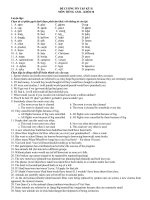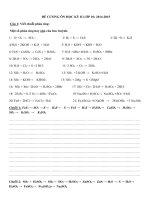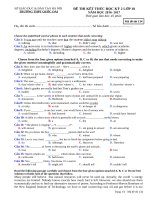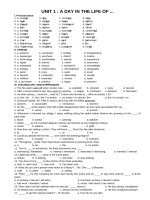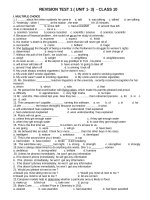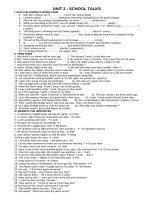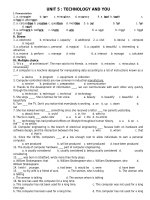ĐỀ CƯƠNG ÔN TẬP KỲ II MÔN TIẾNG ANH – KHỐI 10 doc
Bạn đang xem bản rút gọn của tài liệu. Xem và tải ngay bản đầy đủ của tài liệu tại đây (151.77 KB, 8 trang )
ĐỀ CƯƠNG ÔN TẬP KỲ II
MÔN TIẾNG ANH – KHỐI 10
Luyện tập:
Chọn từ có phần gạch dưới được phát âm khác với những từ còn lại:
1. A. span B. play C. phone D.cup
2. A. cap B. speak C. place D. photo
3. A. ball B. bag C. climb D. label
4. A. limb B. bad C. lab D. baby
5. A. thumb B. balloon C. habit D. bald
6. A. take B. talk C. plant D. fasten
7. A. often B. date C. stop D. fat
8. A. product B. castle C. plant D. limit
9. A. listen B. toxic C. mate D. topic
10. A. late B. hate C. Christmas D. different
11. A. maps B. books C. peas D. story
12. A. communicate B. compose C. victory D. solemn
13. A. music B. busy C. classical D. see
14. A. defeat B. event C. hero D. detective
15. A. risky B. five C. will D. imprison
Chọn đáp án đúng nhất để hoàn thành các câu sau:
1. Sperm whales are (herbivores/omnivores/mammals/carnivores), which means they eat meat.
2. Some plants and animals are referred to as (tiny/large/big/normal) organisms because they are extremely small
3. If I had money, I (would buy/would bought/will buy/would have bought) a dictionary.
4. If I were your teacher, I (will punish/would punish/punish/would have punished) you.
5. We'll get wet if we (go/went/did go/had gone) out
6. If I find it, I (will tell/would tell/had told/told) you.
7. What would you do if you (would win/win/had won/won) a million dollars?
8. They'd be hurt if I (don’t go/didn’t go/hadn’t gone/wouldn’t go)
9. Somebody cleans the room every day
a. The room every day is cleaned b. The room is every day cleaned
c. The room is cleaned every day d. The room is cleaned by somebody every day
10. They cancelled all flights because of fog.
a. All flights because of fog were cancelled. b. All flights were cancelled because of fog.
c. All flights were because of fog cancelled d. All flights were cancelled by them because of fog
11. People don't use this road very often.
a. This road is not used very often b. Not very often this road is not used
c. This road very often is not used d. This road not very often is used
12. A new school (has build/has been build/has been built/have been built)
13. (How/How long/How far/How often) do you visit your grandmother? – Once a week
14. She went to school library (to borrow/borrowing/to borrowing/borrowed) some books.
15. (How many/When/What/How long) have you lived here? – For about 10 years.
16. You look tired. You (will/must/should/would) go to bed early.
17. Her participation has contributed (on/to/in/for) the success of the program.
18. Sea animals fall (for/into/in/to) different groups.
19. Without plants water would run (of/off/down/on) as soon as it falls.
20. This broken cup cannot (repair/to be repaired/be repaired/repairing)
21. The new motorway (planned/was planned/was planning/had planned) and built last year.
22. The photos (were taken/have taken/was taken/have been taken) in a London studio last week.
23. The hotel is (located/put/placed/laid) on top of a hill.
24. If I (had been/were/am/weren’t) you, I’d apply for that job.
25. If I (hadn’t been/weren’t/had been/would have been) ill, I wouldn’t have been absent from class.
26. Animals are carefully taken care (of/on/off/to) in national parks.
27. As the old (silence/silently/silent/musical) films were being replaced by spoken ones on screen, a new cinema form
appeared, the musical cinema.
28. Tien Quan Ca is the national (dance/anthem/wine/dress) of Viet Nam.
29. Some animals are referred to as (large/big/normal/tiny) organisms because they are extremely small
30. Many rare animals are in (risk/stake/danger/development) of being extinction.
31. If I had enough money, I (will buy/would buy/would bought/would have bought) a new house.
32. She would have met him if you (would tell/told/tells/had told) her that he came.
34. What would you do if you (have/has/had/have had) million dollars?
35. My mother is going to Paris (visiting/visited/visit/to visit) my sister.
36. (How/How long/How far/How many) have you worked here? – For about 5 years.
38. This cake (was made/made/has made/makes) by my mother.
40. Michael Jackson was a very (far/famous/first/mystery) singer.
41. Whales and sharks are still (died/hunted/fished/cooked) for food and medicine.
42. One species is dependent on another for (survival/arrival/national/approval)
43. A lot of (empty/lost/orphaned/childlike) animals are taken care of in our zoo.
44. People have sent (submarines/airplanes/spaceships/helicopters) to investigate the seabed.
45. Many sea animals are at (loss/death/risk/danger) due to hunting and water pollution.
46. Music can (express/tell/explain/inform) one’s anger, love or hate.
47. “(How/What/How by/On which) did you get to the theatre?” – I went by bus.
48. (Why/How often/What/What purpose) are you going to buy a new cassette recorder for?
49. Music is very much a/an (internal/enormous/integral/heavy) part of our life.
50. In the first two decades of its (appearance/existence/achievement/fame), the cinema developed rapidly.
51. In the 1900s films used changes of (scene/scenery/object/action) and camera positions to tell a story.
52. The baby is (excited/interested/bored/fascinated) about his new toy.
53. I think England (won/will win/shall win/is going to win) this match.
54. Brazil defeated Italy ……4… 1 in the 1970 World Cup. (by/to, by/by, to/by, to/to).
55. Spain became the (witness/host/runner-up/champion) in the 2010 World Cup.
56. Only 13 football teams (paid attention/connected/took part/linked) in the first WC in Uruguay in 1930.
57. One of the largest cities in the Middle East is Baghdad, (that/which/where/x) is the capital of Iraq.
58. A woman (who/whom/she/which) teaches linguistics at the university received an award for outstanding research.
59. Although I was very tired, (but I walked all way home/I walked all way home/however I walked all way home/so I
walked all way home).
60. (Though being thirsty/Even though his thirsty/Despite he was thirsty/Although he was thirsty), Thomas refused the
water.
61. She is famous all over (a/an/the/x) world.
Tìm và sửa lỗi sai trong các câu sau:
1. This is Mr. Long, that I told you about yesterday.
2. My brother is interested on reading books before going to bed.
3. How many have you lived here? – We have lived here for 10 years
4. How did that car cost you? – It cost me 1 million dollars.
5. If you had gone to class regularly, you would passed the exam.
6. She is filling the bucket with water to washing her car.
7. If I were you, I would told her the truth.
8. The classroom has cleaned by the monitor this morning.
9. The car which Mr. Long bought yesterday was produce in Japan.
10. What kinds of animals do take care of in the Orphanage?
Đặt câu hỏi cho từ gạch chân:
1. The shop is in front of the book store.
2. It takes Mr. Lam fifteen minutes to walk to his office.
3. We are going to London by sea.
4. I’d like to buy some local goods.
5. Tam goes to the club three times a month.
6. There are over 1989 stamps in his stamp collection.
7. Minh needs a phone card because he wants to give her parents a call.
8. I was late for work this morning because there was too much traffic.
9. Nam began to study English six years ago.
10. She is worried about the next examination.
11. His father felt better after he took a nap.
12. It takes me 15 minutes to go to school.
Chuyển các câu sau sang câu bị động:
1. Miss Lan teaches us grammar and writing.
2. The police have found him several days.
3. She couldn’t open the door of the classroom.
4. The government will build the bridge in next July.
5. Thomas Edition invented the electricity light bulb.
6. They are going to visit their grandmother on the weekend.
7. Tam advised me to take part in the course.
8. She has done that work since last week.
9. The heavy rain may damage the crop.
10. She shouldn’t announce that news early.
12. They export bananas to Europe.
13. Many visitors have visited Kuala Lumpur recent years.
14. The students are going to plant more trees in the school garden.
15. Bob didn’t take that book from the desk.
16. People should keep fruits in the fridge for long.
17. They will cut the grass in the park next week.
18. When did they decorate the kitchen?
19. They might build a new supermarket in the neighborhood.
20. The librarian arranges books on the shelf against the wall.
21. Why don’t you write a novel?
22. He often sends postcards to his mother.
23. How do you make a survey?
24. Children should treat old men with respect.
25. Will you post this letter on the way to work?
Đọc đoạn văn, sử dụng thông tin trong bài để trả lời các câu hỏi sau:
A. My name is Peter and my day usually begins at six thirty. I get up and do some exercises for about fifteen minutes.
Then I take my shower. After that I get dressed and have breakfast with my family. I usually have a light breakfast with
bread and eggs. At seven thirty I leave for school. I generally take the bus to school. I catch the bus near my house and
then walk from the bus-stop to my school. It takes about twenty minutes to get to school. My first class is at half past
eight and I usually finish school at three. Sometimes I stay late to have a game of volleyball or work in the library. I
usually reach home at around four o’clock. When I get home I like to watch TV for a moment. Then I start my
homework. I have dinner at seven o’clock. After that I often have more homework to do. Sometimes I watch TV or go
out with my friends after dinner. I often go to bed at about a quarter to eleven.
1. What time does Peter’s day usually begin?
2. What does he have breakfast with?
3. How does he go to school?
4. How long does it take him to get to school?
5. When is his first class?
6. What time does he usually finish school?
7. Why does he sometimes stay late?
8. Does he come home at six o’clock?
9. What does he do when he gets home?
10. What does he sometimes do after dinner?
B. The life of the Inuit people of North America have changed a lot in 30 years. First, their name: people used to call
them Eskimos, but now they are called Inuit which means “the people”. They used to live in igloos in the winter but
today many of them live in houses in small towns. They used to hunt seals – they ate the meat and made clothes from
fur. Many of the people still wear sealskin clothes today because they are very warm. Remember, the weather is
extremely cold for many months of the year. Eighty-year-old Inuit, Mario Tagalik, told us a little about his early life:
“Our winter igloos were very warm. We used to cook inside so sometimes it got too hot. When I was a child I used to
take off most of my clothes when I was in igloos. In the short summers we lived in sealskin tents. But I used to spend as
much time as possible playing outside”.
1. What did people use to call the Inuit people?
2. What does the word “Inuit” mean?
3. Where did they use to live in the winter?
4. Why do many of the Inuit people still wear sealskin clothes today?
5. What is the weather like almost around the year?
Viết lại các câu sau bắt đầu bằng “if”
1. Alan always overeats at lunch because he never eats breakfast.
2. I don't know enough about the machine, so I can't mend it myself.
3. I don't ride the bus to work every morning because it's always so crowded.
4. Not enough money is spent on cancer research, so prevention has not been found.
5. The wind blows hard, so I can’t take the boat out for a ride.
6. Nick can't find the way because he hasn't got a map.
7. Schroeder ignores Lucy, so she
g
ets angry at him.
8. I can't look the word up because I don’t have a dictionary.
9. We don't visit our parents very often because they live so far away.
10. He didn’t know how to solve the mathematics problem, so he got low marks.
11. She didn’t say sorry, so he got angry.
12. It rained last night, so I didn’t go to the barbecue.
13. We didn’t go camping because the weather was not very nice.
14. He was angry, so I didn’t say anything.
15. He was interested in playing games, so he didn’t study his lessons.
16. Mary didn’t come, so we cancelled the meeting.
Viết lại các câu sau bắt đầu bằng “It was not until…”:
1. The child didn’t go to sleep until her mother came home.
2. The boy didn’t tell the truth until his father threatened to punish him.
3. The patient’s heart condition didn’t improve until she received that new treatment.
4. He didn’t stop working until he felt too tired.
5. The police didn’t make any accusations until they had some proof.
Viết lại câu bắt đầu bằng từ gợi ý sao cho nghĩa câu không thay đổi:
1. Some evenings I go to the library because I want to study in peace and quiet.
Some evenings I go to the library to…………
2. He wanted to watch the news, so he turned on the TV. He turned on the TV to………
3. He wrote a letter to his parents because he wanted to ask them for some money.
He wrote a letter to his parents to…
4. She didn’t begin to learn English until 1980. It was …….
5. We didn’t study English until we began primary school. It was …….
6. I didn’t learn English until 2002. It was …….
7. He didn’t know how to swim until he was 30. It was …….
8. They didn’t begin to learn English until 1980. It was …….
9. The boy didn’t do his homework until his father came home. It was …….
10. I stopped my work because the computer broke down. If……
11. He didn’t listen to the teacher, so he had low marks in the final exam. If….
12. He drove so fast, so he crashed into a tree. If……
13. I don’t have a computer, so I can’t type it myself. If……….
14. I am not a millionaire, so I can’t do such a thing. If…………
15. We don’t have any money left, so we can’t have dinner. If…….
16. We wanted to get warm, so we moved closer to the fire . We moved closer to the fire to ….
17. The postman usually leaves letters in the hall. Letters……………
18. He gave me this book yesterday. I…………
19. Will you finish the report next week? Will the…
20. She is going to buy a cookery book. A cookery book……….
21. Mr. Nam gives lectures in universities every day. Lectures………
22. How did you make this cake? How was………………
23. I have seen this film three times. This film……………
ĐÁP ÁN ĐỀ CƯƠNG ÔN TẬP KỲ II
MÔN TIẾNG ANH – KHỐI 10
Luyện tập:
Chọn từ có phần gạch dưới được phát âm khác với những từ còn lại:
16. A. span B. play C. phone D.cup
17. A. cap B. speak C. place D. photo
18. A. ball B. bag C. climb D. label
19. A. limb B. bad C. lab D. baby
20. A. thumb B. balloon C. habit D. bald
21. A. take B. talk C. plant D. fasten
22. A. often B. date C. stop D. fat
23. A. product B. castle C. plant D. limit
24. A. listen B. toxic C. mate D. topic
25. A. late B. hate C. Christmas D. different
26. A. maps B. books C. peas D. story
27. A. communicate B. compose C. victory D. solemn
28. A. music B. busy C. noisy D. see
29. A. defeat B. event C. hero D. detective
30. A. risky B. five C. will D. imprison
Chọn đáp án đúng nhất để hoàn thành các câu sau:
1. Sperm whales are (herbivores/omnivores/mammals/carnivores), which means they eat meat.
2. Some plants and animals are referred to as (tiny/large/big/normal) organisms because they are extremely small
3. If I had money, I (would buy/would bought/will buy/would have bought) a dictionary.
4. If I were your teacher, I (will punish/would punish/punish/would have punished) you.
5. We'll get wet if we (go/went/did go/had gone) out
6. If I find it, I (will tell/would tell/had told/told) you.
7. What would you do if you (would win/win/had won/won) a million dollars?
8. They'd be hurt if I (don’t go/didn’t go/hadn’t gone/wouldn’t go)
9. Somebody cleans the room every day
a. The room every day is cleaned b. The room is every day cleaned
c. The room is cleaned every day d. The room is cleaned by somebody every day
10. They cancelled all flights because of fog.
a. All flights because of fog were cancelled. b. All flights were cancelled because of fog.
c. All flights were because of fog cancelled d. All flights were cancelled by them because of fog
11. People don't use this road very often.
a. This road is not used very often b. Not very often this road is not used
c. This road very often is not used d. This road not very often is used
12. A new school (has build/has been build/has been built/have been built)
13. (How/How long/How far/How often) do you visit your grandmother? – Once a week
14. She went to school library (to borrow/borrowing/to borrowing/borrowed) some books.
15. (How many/When/What/How long) have you lived here? – For about 10 years.
16. You look tired. You (will/must/should/would) go to bed early.
17. Her participation has contributed (on/to/in/for) the success of the program.
18. Sea animals fall (for/into/in/to) different groups.
19. Without plants water would run (of/off/down/on) as soon as it falls.
20. This broken cup cannot (repair/to be repaired/be repaired/repairing)
21. The new motorway (planned/was planned/was planning/had planned) and built last year.
22. The photos (were taken/have taken/was taken/have been taken) in a London studio last week.
23. The hotel is (located/put/placed/laid) on top of a hill.
24. If I (had been/were/am/weren’t) you, I’d apply for that job.
25. If I (hadn’t been/weren’t/had been/would have been) ill, I wouldn’t have been absent from class.
26. Animals are carefully taken care (of/on/off/to) in national parks.
27. As the old (silence/silently/silent/musical) films were being replaced by spoken ones on screen, a new cinema form
appeared, the musical cinema.
28. Tien Quan Ca is the national (dance/anthem/wine/dress) of Viet Nam.
29. Some animals are referred to as (large/big/normal/tiny) organisms because they are extremely small
30. Many rare animals are in (risk/stake/danger/development) of being extinction.
31. If I had enough money, I (will buy/would buy/would bought/would have bought) a new house.
32. She would have met him if you (would tell/told/tells/had told) her that he came.
34. What would you do if you (have/has/had/have had) million dollars?
35. My mother is going to Paris (visiting/visited/visit/to visit) my sister.
36. (How/How long/How far/How many) have you worked here? – For about 5 years.
38. This cake (was made/made/has made/makes) by my mother.
40. Michael Jackson was a very (far/famous/first/mystery) singer.
41. Whales and sharks are still (died/hunted/fished/cooked) for food and medicine.
42. One species is dependent on another for (survival/arrival/national/approval)
43. A lot of (empty/lost/orphaned/childlike) animals are taken care of in our zoo.
44. People have sent (submarines/airplanes/spaceships/helicopters) to investigate the seabed.
45. Many sea animals are at (loss/death/risk/danger) due to hunting and water pollution.
46. Music can (express/tell/explain/inform) one’s anger, love or hate.
47. “(How/What/How by/On which) did you get to the theatre?” – I went by bus.
48. (Why/How often/What/What purpose) are you going to buy a new cassette recorder for?
49. Music is very much a/an (internal/enormous/integral/heavy) part of our life.
50. In the first two decades of its (appearance/existence/achievement/fame), the cinema developed rapidly.
51. In the 1900s films used changes of (scene/scenery/object/action) and camera positions to tell a story.
52. The baby is (excited/interested/bored/fascinated) about his new toy.
53. I think England (won/will win/shall win/is going to win) this match.
54. Brazil defeated Italy ……4… 1 in the 1970 World Cup. (by/to, by/by, to/by, to/to).
55. Spain became the (witness/host/runner-up/champion) in the 2010 World Cup.
56. Only 13 football teams (paid attention/connected/took part/linked) in the first WC in Uruguay in 1930.
57. One of the largest cities in the Middle East is Baghdad, (that/which/where/x) is the capital of Iraq.
58. A woman (who/whom/she/which) teaches linguistics at the university received an award for outstanding research.
59. Although I was very tired, (but I walked all way home/I walked all way home/however I walked all way home/so I
walked all way home).
60. (Though being thirsty/Even though his thirsty/Despite he was thirsty/Although he was thirsty), Thomas refused the
water.
61. She is famous all over (a/an/the/x) world.
Tìm và sửa lỗi sai trong các câu sau:
11. This is Mr. Long, that I told you about yesterday. who
12. My brother is interested on reading books before going to bed. in
13. How many have you lived here? – We have lived here for 10 years. How long
14. How did that car cost you? – It cost me 1 million dollars. How much
15. If you had gone to class regularly, you would passed the exam. would have passed
16. She is filling the bucket with water to washing her car. wash
17. If I were you, I would told her the truth. would tell
18. The classroom has cleaned by the monitor this morning. has been cleaned
19. The car which Mr. Long bought yesterday was produce in Japan. was produced
20. What kinds of animals do take care of in the Orphanage? are taken
Đặt câu hỏi cho từ gạch chân:
1. Where is the shop?
2. How long does it take Mr. Lam to walk to his office?
3. How are you going to London?
4. What would you like to buy?
5. How often does Tam go to the club?
6. How many stamps are there in his stamp collection?
7. Why does Minh need a phone card?
8. Why were you late for work this morning?
9. When did Nam begin to study English?
10. What is she worried about?
11. How did his father feel after he took a nap?
12. How long does it take you to go to school?
Chuyển các câu sau sang câu bị động:
1. We are taught grammar and writing by Miss Lan
2. He has been found by the police several days.
3. The door of the classroom couldn’t be opened by her.
4. The bridge will be built in next July.
5. The electricity light bulb was invented by Thomas Edison.
6. Their grandmother is going to be visited by them on the weekend.
7. I was advised to thake part in the course by Tam.
8. That word has been done by her since last week.
9. The crop may be damaged by the heavy rain.
10. That news shouldn’t be announced early.
12. Bananas are exported to Europe.
13. Kuala Lumpur has been visited by many visitors recent year.
14. More trees are going to be planted in the school garden by the students.
15. That book wasn’t taken from the desk by Bob.
16. Fruits should be kept in the fridge for long.
17. The grass in the park will be cut nex tweek.
18. When was the kitchen decorated?
19. A new supermarket might be built in the neighborhood.
20. Books are arranged on the shelf against the wall.
21. Why isn’t a novel written by you?
22. Postcards are often sent to his mother by him.
23. How is a survey made?
24. Old men should be treated with respect.
25. Will this letter be posted on the way to work by you?
Đọc đoạn văn, sử dụng thông tin trong bài để trả lời các câu hỏi sau:
A
2. At 6 thirty/At six thirty.
3. He has a light breakfast with bread and eggs.
4. By bus
5. about twenty minutes
6. At half past eight.
6. At three pm
7. Because he has a game of volleyball or work in the
library.
8. No, he doesn’t
9. He watches TV for a moment, then he does his
homework.
10. He watches TV or goes out with his friends.
B.
6. They used to call them Eskimos.
7. It means “the people”
8. They used to live in igloos
9. Because they are warm
10. The weather is extremely cold for many months of the year
Viết lại các câu sau bắt đầu bằng “if”
17. If Alan ate breakfast, he wouldn’t overeat at lunch.
18. If I knew enough about the machine, I could mend it myself.
19. If it weren’t always so crowded, I would ride the bus to work every morning.
20. If enough money were spent on cancer research, prevention would have been found
21. If the wind didn’t blow hard, I could take the boat out for a ride.
22. If Nick had got a map, he could find the way.
23. If Schroeder didn’t ignore Lucy, she wouldn’t get angry at him.
24. If I had a dictionary, I couldn’t look the word up.
25. If our parents didn’t live too far away, we would visit our parents very often.
26. If he had known how to solve the mathematics problen, he would not have got low marks.
27. If she had said sorry, he wouldn’t have got angry.
28. If it didn’t rain last night, I would have gone to the barbecue.
29. If the weather had been very nice, we would have gone camping.
30. If he hadn’t been so angry, I would have said something.
31. If he hadn’t been interested in playing games, he would have studied his lessons.
32. If Mary had come, we wouldn’t have cancelled the meeting.
Viết lại các câu sau bắt đầu bằng “It was not until…”:
6. It was not until the child’s mother came home that the child went to school.
7. It was not until the father’s boy threatened to punish him that he went to sleep.
8. It was not until the patient received that new treatment that her heart condition improved
9. It was not until he felt too tired that he stopped working.
10. It was not until the police had some proof that they made some accusations.
Viết lại câu bắt đầu bằng từ gợi ý sao cho nghĩa câu không thay đổi:
24. Some evenings I go to the library because I want to study in peace and quiet.
Some evenings I go to the library to study in peace and quiet
25. He wanted to watch the news, so he turned on the TV. He turned on the TV to watch the news.
26. He wrote a letter to his parents because he wanted to ask them for some money.
He wrote a letter to his parents to ask them for some money.
27. She didn’t begin to learn English until 1980. It was not until 1980 that she began to learn English.
28. We didn’t study English until we began primary school. It was not until we began primary school that
we studied English.
29. I didn’t learn English until 2002. It was not until 2002 that I learned English
30. He didn’t know how to swim until he was 30. It was not until he was 30 that he knew how to swim.
31. They didn’t begin to learn English until 1980. It was not until 1980 that they began to learn English.
32. The boy didn’t do his homework until his father came home. It was not until the boy’s father came
home that he did his homework.
33. I stopped my work because the computer broke down. If the computer hadn’t broken down, I wouldn’t
have stopped my work.
34. He didn’t listen to the teacher, so he had low marks in the final exam. If he had listened to the teacher,
he wouldn’t have had low marks in the final exam.
35. He drove so fast, so he crashed into a tree. If he hadn’t driven so fast, he wouldn’t crashed into a tree.
36. I don’t have a computer, so I can’t type it myself. If I had a computer, I could type it myself
37. I am not a millionaire, so I can’t do such a thing. If I were a millionaire, I could do such a thing.
38. We don’t have any money left, so we can’t have dinner. If we had some money left, we could have
dinner.
39. We wanted to get warm, so we moved closer to the fire . We moved closer to the fire to get warm
40. The postman usually leaves letters in the hall. Letters are usually left in the hall by the postman
41. He gave me this book yesterday. I was given this book by him yesterday.
42. Will you finish the report next week? Will the report be finished next week?
43. She is going to buy a cookery book. A cookery book is going to be bought by her.
44. Mr. Nam gives lectures in universities every day. Lectures are given in universities by Mr. Nam everyday.
45. How did you make this cake? How was this cake made?
46. I have seen this film three times. This film has been seen three times by me.

